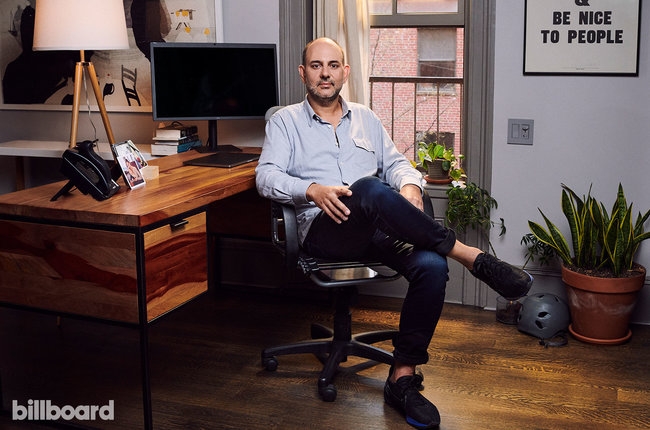Darius Van Arman is involved in so many projects it can be hard to keep track of them all. "I'm like that character in Rushmore," he says, referring to the Wes Anderson film in which the protagonist (Max Fischer, played by Jason Schwartzman) gets suspended for skipping class to pursue a ridiculous number of extracurriculars. These days, the co-CEO of Secretly Group and Secretly Distribution -- the latter with his business partners Chris Swanson and his brother Ben Swanson, who co-founded the Secretly Canadian imprint -- has his hands in almost every aspect of the music business.
In addition to the distributor and the label group -- which includes indie labels Secretly Canadian, Dead Oceans and Jagjaguwar, along with Secretly Publishing -- Van Arman, 47, maintains a passive investment in the Independent Record Pressing plant and owns part of reissue imprint Numero Group. He also co-founded Fort William Management, home to Grizzly Bear, Kevin Morby, Beirut and more, though he recently sold that company to co-founder Ami Spishock. Earlier in 2019, Van Arman and Swanson invited Dead Oceans co-founder Phil Waldorfto partner with them on all three labels, to make ownership equal. "It was muddier before, but now it's clarified," says Van Arman of his intertwined, complementary obligations.
Van Arman's do-it-yourself, soup-to-nuts approach to the music biz began at the University of Virginia, which he attended in the 1990s. A mathematics major who juggled commitments to the college newspaper, radio station and local art magazine, he also booked shows in the basement of a sushi restaurant for indie-rock royalty like Neutral Milk Hotel and Sleater-Kinney. When the United Kingdom's Cargo Records paid $350 in 1996 for the rights to distribute physical copies of the band Drunk's CD, which Van Arman had released on his Jagjaguwar label and which got a positive review in Melody Maker, he realized Jagjaguwar could be his career.
"I was like, 'Wow. You send one CD to one place, they review it, someone's then going to order 50 copies of a CD and there are people who are actually going to buy those CDs?'" he recalls. "My mind was blown." Soon thereafter, the founders of Secretly Canadian invited Van Arman to move to Bloomington, Ind., and go into business with them.

Secretly's roster includes Bon Iver, The War on Drugs and Mitski, and Van Arman has made it his life's work to advocate for independent artists. As chairman of the board of directors at the American Association of Independent Music (A2IM), a founding council member of the Worldwide Independent Network and a member of the boards of directors for both Merlin and SoundExchange, he has successfully negotiated the multiyear licensing agreement between Spotify and Merlin, and testified on licensing reform before Congress in 2014, among other initiatives.
"Our company is oriented around the concept that, yes, we have to pay attention to being profitable, because we need to be sustainable and reach more ears and eyes, and we need to invest in our artists' careers," says Van Arman. "But it's only so we can increase our capacity to do good in the world." At Secretly Group's Brooklyn offices, Van Arman spoke about growing artist services, maintaining healthy competition in a consolidating business and the future of the indie sector.
You're involved in three labels, a reissue imprint, a publishing house, a distribution arm and an investment in a pressing plant. Is this kind of integration key to success as an indie?
Sometimes yes, sometimes no. It's good to have an understanding of how parts of the music industry work together. When you can share back office over different functions, it makes each of those functions more sustainable. It's still better to press your vinyl wherever you think is best, regardless of whether you have ownership in the plant. The downside is, it's really hard to be a successful label group; it's really hard to be a successful distribution platform; it's really hard to be a successful publisher. And it's really, really, really hard to be successful at all three when the same management group runs it.

When you brought Secretly's label A&R under the same management as its publishing A&R last year, did that change how you approach creators?
A little bit. It was always awkward to have that conversation, "Should you sign them to a publishing deal as a songwriter, or let Dead Oceans sign them as a recording artist, or do an agreement that offers both at the same time?" Then it dawned on us that there's a similar approach here: There was always this feeling that Secretly Group labels were relying on Secretly Publishing as if it were a separate company, but we both want to work with amazing songwriters and creators. It also simplified how we thought of the synchronization licensing work we did. We had a sync team that Secretly Publishing ran, that was part of the publishing balance sheet but was also managing the masters side, the recording side and synchronization licensing pitches.
Spotify is offering more artist services for unsigned acts. How has that affected your business?
People ask, "Are you pissed off that artists can go direct with Spotify?" No, we support it. Artists should have options, and we hope they choose to work with us, but they should choose to work with us because we're offering value. We are not afraid of having that conversation with artists who are trying to consider one path or the other. There isn't a distribution fee or a label-percentage revenue share [with Spotify], but we think, big picture, that our distribution business is offering services that really support the artist: playlist pitching, data analytics, marketing expertise and distribution to hundreds of streaming services around the world. We aggregate that data and pay once a month. A distribution platform may take more of an artist's earnings than Spotify, but artists are getting much more in the end because a distribution platform offers much more in the way of artist services than Spotify.

You've spoken about the importance of a healthy marketplace.
In some ways, consolidation makes it harder for burgeoning and experimental voices to find traction. In other ways, these companies that are transparency-oriented and providing platforms that make the market accessible to all artists are invigorating. But some feel like they're Uber-izing the music industry. When too much of the buying and selling is in the hands of too few companies, that's when the market becomes distorted. Can creators and their labels and companies that partner with artists collectively get sufficient leverage to get reasonable return in a marketplace where everything is so fractured? I hope over time, we go in the other direction, but not so far where songwriters and recording artists can't make careers out of a pursuit of making music. We really need that healthy return to those who are actually creating, not the middle people, to sustain everything.
With Merlin, it seems like a benefit of consolidation is when it goes toward negotiation and advocacy.
Absolutely. When a bunch of competitors that take up 5%-10% of the market collectivize their rights, it gives them the opportunity to be on a level playing field with Universal at 40%, Sony at 30% and Warner Music Group at 15%-20%. Merlin consolidating the voice of the indies to do digital licenses that are competitive with the biggest companies' is such an important linchpin. You want the market to allow enough competition that when it does find its own shape, it's something that reflects healthy competitive dynamics.

This article originally appeared in the April 27 issue of Billboard.





